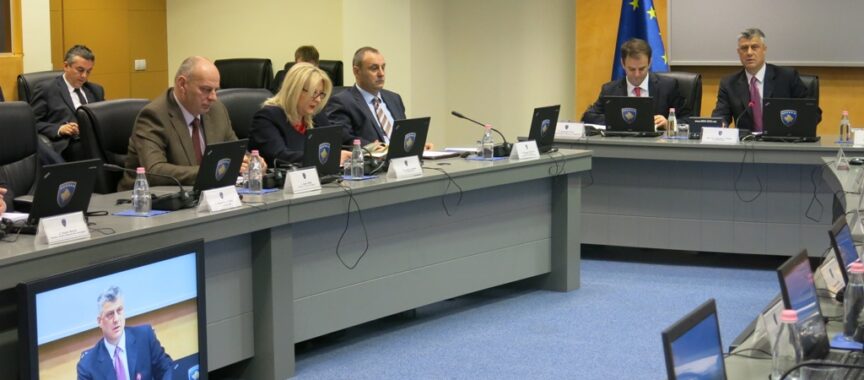Prishtina, 5 April 2013
In today’s meeting, the first decision of the Kosovo Government was to appoint seven mediators for copyright issues, respectively for disputes relating to agreements foreseen in the Law on Copyright and related Rights.
According to the decision, the mediators appointed are:
1. Ilir Gaxha, mediator;
2. Mentor Hajdaraj, mediator;
3. Besim Kajtazi, mediator;
4. Albana Tigani, mediator;
5. Destan Bujupi, mediator;
6. Jusuf Jahmurtaj, mediator;
7. Faton Morina, mediator.
Following this, the Minister of Economic Development presented information about the work of the Government Committee on the PTK privatization. The Minister informed the government cabinet that when the bids were opened, there were two and currently these offers are being legally assessed. Very soon, financial bids will be opened in a transparent and public manner.
The Minister expressed the conviction that the process will end successfully.
In today’s meeting, the Kosovo Government approved the Statement on Medium-Term Priorities which sets out the framework of policies and projects which the Government of the Republic of Kosovo plans to implement during the future medium-term period of 2014-2016. This document will be a key mechanism which will guide the Government in planning Kosovo’s budget and orienting other budgetary resources for a future three year period. The Medium-Term Expenditure Framework 2014-2016 is a key document that links government policies and priorities with the budgetary plan of the country.
The Statement defines existing policies and new ones in key areas for the country’s development, which relate to the fiscal, social and economic objectives of the Government. This planning document was drafted by the Office of Strategic Planning under the supervision of the Steering Group on Strategic Planning and in cooperation with other ministries and institutions in specific fields. The statement represents a clear and progressive basis upon which to develop the Government’s work toward achieving its objectives set out in the program approved in 2011.
The implementation of priority policies set out in the Statement will be conducted with budgetary resources which are covered by tax and non-tax revenue presented in the Macro-fiscal Framework 2014-2016. The start of the implementation of the fiscal regulation, which from 2014 onwards limits Kosovo’s budgetary deficit to 2% of GDP, and limits the increase of total revenues in line with economic growth requires extra prudence with regard to including new policies within the budget framework. The budgetary framework includes contracted and negotiated credits with international financial institutions which are included within the presented budgetary limits.
The document aims to set out policies that require financing from various sources, including donors, other development partners or other mixed forms of financing (Private Public Partnership) which have will not have been identified yet in the next three years, or policies that will begin over the next three years.
The Statement also anticipates policies and projects which are supported by donors and alternative sources of financing from the private sector and other combined forms of financing. Policies that cannot be covered by the current budgetary framework envisioned will be directed toward other alternative financial resources as yet unplanned.
The execution of policies set out in the Statement will create conditions for the necessary reform of particular sectors, through which economic, social and institutional preconditions will be met for the alignment of the Republic of Kosovo with the European Union, NATO and other international mechanisms.
By a decision approved today in the meeting of the Kosovo Government, a Working Group was formed to advance the policy for the employment of communities, which is directed by the Deputy Prime Minister of the Republic of Kosovo and Minister of Local Government, Mr. Slobodan Petrovic.
The working group will be comprised of the following:
1. Srdjan Popovic – Senior Advisor to the Prime Minister – Director of the Office of Communities – PMO;
2. Representative of SPO-PMO;
3. Representative of GCS-PMO;
4. Representative of the Legal Office, LO-PMO;
5. Representative of Consultative Council for Communities;
6. Representative of Ministry of Public Administration;
7. Representative of Ministry of Labor and Social Welfare;
8. Representative of Ministry of Internal Affairs;
9. Representative of Ministry of Local Government;
10. Representative of Ministry of Justice;
11. Representative of Ministry of Communities and Return;
12. Ombudsperson;
13. Representative of the Assembly;
14. Representative of the Kosovo Police;
15. Representative of the Association of Kosovo Municipalities;
16. Representative of Kosovo Customs;
17. Representative of Kosovo Railways;
18. Representative of Kosovo Energy Corporation;
19. Representative of Kosovo Post and Telecommunications;
20. Representative of Kosovo Radio and Television;
21. Anti-Corruption Agency;
22. Kosovo Statistics Agency;
As experts and external assistants, the following will be invited:
1. Representative of the US Embassy in Kosovo;
2. Representative of the Norwegian Embassy in Kosovo;
3. Representative of the British Embassy in Kosovo;
4. Representative of the German Embassy in Kosovo;
5. Representative of the Swiss Embassy in Kosovo;
6. Representative of the OSCE Mission in Kosovo;
7. Representative of the Office of the European Union in Kosovo/EU Special Representative,
8. Representative of the UN Development Program;
9. Representative of the European Center for Minority Issues.
With the purpose of advancing the application of the law which regulates the employment of non-majority communities, the working group will prepare recommendations, measures and other necessary directives to empower and build capacities making more effective mechanisms that regulate the employment of non-majority communities.
The Government approved a Regulation for the Implementation of Standards of Classification for Economic Activities. This Regulation defines the standard nomenclature of economic activity according to which classification and ranking of businesses and other organizations will be done in a single register, as an automatic record of classification across the country.
The nomenclature of economic activity will be applied to the collecting, classification and publication of official data. The fundamental element of the integrated international system of economic classification is based on the classification of the Statistical Committee of the United Nations, Eurostat and strong national classifications which are related to each other, allowing the comparison of economic statistics across the world among different institutions.
The Regulation on the organizational structure of the Office of the Prime Minister aims to define the internal organization of the Office of the Prime Minister and other administrative state bodies under its supervision. This regulation applies to the Office of the Prime Minister and other administrative state bodies under its supervision.
The duties and responsibilities of the Office of the Prime Minister and other administrative state bodies under its supervision are defined in the Regulation on the rules of Procedure of the Government and the Regulation on the areas of administrative jurisdiction of the Office of the Prime Minister and ministries, and the respective legislation in force.
To effectively accomplish its responsibilities, authorizations and working duties assigned, the Office of the Prime Minister is comprised of the following structure:
• Prime Minister;
• Deputy Prime Minister/s;
• Prime Minister’s Cabinet, including the Offices or units that work for the Prime Minister’s Cabinet, including:
1. The Office for Categories deriving from the Kosovo Liberation Army War;
2. The Government Committee on Missing Persons;
3. The Office of the Council on Regional Cooperation;
4. The Office for Community Affairs;
5. The Office of the Commissioner for Languages;
6. The Committee for the Investigation of Aeronautical Accidents and Incidents;
7. The Coordinator for Property Rights;
8. The Unit for Internal Audit;
9. Government Spokesperson;
The central administrative state bodies that act under the Office of the Prime Minister are:
1. The Agency for Gender Equality (AGE);
2. The Kosovo Statistics Agency (KSA);
3. The State Archives Agency (SAA);
4. The Kosovo Agency for Radiation Protection and Nuclear Safety (KARPNS);
5. The Food and Veterinary Agency (FVA);
6. The Secretariat of the Security Council (SCS);
The Office of the Secretary General of the Office of the Prime Minister supervises offices which include: offices at the central level of the state administration which report to the Office of the Prime Minister and which exercise competences in all ministries and other executive bodies, in order to support the Prime Minister, to ensure that all Ministries are acting in alignment with government policy and to enforce the law:
1. Strategic Planning Office (SPO);
2. Government Coordinating Secretariat (GCS);
3. Legal Office (LO);
4. Public Communications Office (PCO);
5. Good Governance Office (GGO).
The offices of the PMO that report to the General Secretary of the PMO and which act in support of respective units within the PMO to accomplish administrative duties and other duties defined by the legislation in force, are:
1. Office for the publication of the Official Gazette of Kosovo (OOGK);
2. Budget and Finance Office (BFO);
3. Public Procurement Office (PPO);
4. Central Administration Office (CAO), and
5. Human Resources Office (HRO).
The Kosovo Government approved a decision to meet its financial obligations to the Council on Regional Cooperation for 2012. The amount was determined formally in the meeting of the Round-table on the Stability Pact for South Eastern Europe in Bucharest, in November 2006, and the annual contribution of the Republic of Kosovo is 4 per cent of the total amount of countries in South Eastern Europe.
In today’s meeting, the Kosovo Government recommended that the Municipality of Skenderaj’s request for removal from privatization list of the property in the cadastral zone of the village of Runik is addressed to the Kosovar Privatization Agency, and to transfer the property to the ownership of the Skenderaj municipality in the public interest.
Last modified: July 31, 2022


